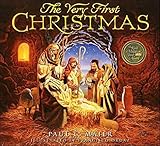Memories shared around favored Christmas books is one of our most beloved ways to celebrate the season. There are many things to see and do at Christmastime that involve activities outside the home, but books provide the perfect stay at home shared time which can take you back in time or to another location entirely. Books allow us to walk in other people’s shoes and experience life as they have. Be it the orphaned child, the homeless family, the shepherd boy, or an elderly woman seeking to catch a glimpse of Christmas magic, you and your family can enter their world and learn empathy and lessons to guide your own steps. Check a few of these out at your local library, favorite thrifted bookstore, or purchase them online at the links below and give them a try.
Her spirits, which had been high, fell a little as a sense of time touched her. How slowly it crawled and yet how fast it flew. She had been young and now she was old and the years between had vanished as though they had never been. ~Elizabeth Goudge, I Saw Three Ships
Stay tuned for our favorite Christmas chapter books later this week. But for now, here is one to get you started!
Merry Reading,



































